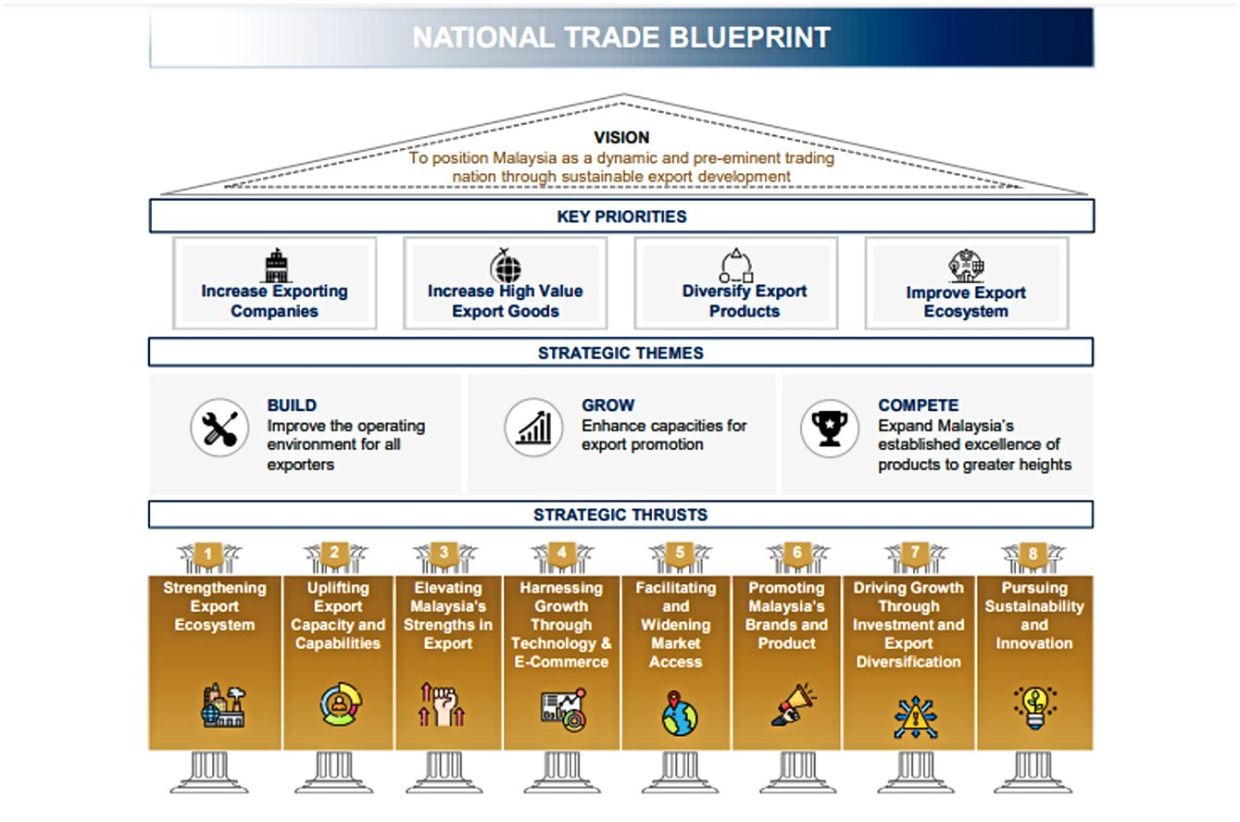KUALA LUMPUR: The global economic environment currently presents both challenges and opportunities for Malaysia as it re-emerges from the aftermath of the Covid-19 pandemic.
Not to let a crisis go to waste, the Government has emphasised on realigning growth in a sustainable trajectory, which includes restoring the growth momentum of key economic sectors, and propelling strategic and high impact industries including micro, small and medium enterprises (MSMEs).
These are of vital importance as Malaysia sets its sights on becoming a high-income nation driven by advanced technology, which will see the country move towards high value-added and high-skilled economic activities.
Against this backdrop and given the significant contribution of trade to Malaysia’s economy, the Malaysia External Trade Development Corporation (MATRADE) developed the National Trade Blueprint (NTBp).
It is the first blueprint of its kind, commissioned by the International Trade and Industry Ministry (MITI). The NTBp was launched by Prime Minister Datuk Seri Ismail Sabri Yaakob on Oct 25, 2021.
“NTBp outlines a five-year (2021-2025) development strategy and initiatives to enhance the nation’s export competitiveness through the strengthening of the business ecosystem and to improve Malaysia’s position as a leading exporting country globally in the merchandise sector,” said MATRADE chief executive officer Mohd Mustafa Abdul Aziz.
This is led by four key priorities, three strategic themes and eight strategic thrusts (see infographic).Eight working groups have been formed to implement the recommendations put forth by the NTBp – Trade Facilitation; Logistics; Standards and Conformance; Trade Promotion and Market Access; Sustainability and Innovation; Digitalisation and Technology; Investment; and Branding.
The working groups comprise relevant members from the public sector, and representatives from various ministries and agencies, the private sector, business communities and trade associations.
The NTBp also leverages on the Jawatankuasa Koordinasi Export (JK-X), chaired by the Chief Secretary to the Government as the governing and supervising body on the implementation of the 40 recommendations and the 127 initiatives under the blueprint. The committee meets thrice a year.
The working groups have hit the ground running such as the logistics unit, whereby the Transport Ministry has revised the policy to allow sharing of prime movers and trailers within the same group of companies.
This reduces capital and operating cost by 10% to 20% to resolve the issue of high ancillary port charges, contributed by the ability of transport companies to optimise existing partnerships without having to increase the number of trailers.
Similarly, under the Trade Promotion and Market Access working group, MATRADE is currently coordinating the development of the Single Information Portal for Export (SIPE) and Integrated Trade Events Platform (ITEP). These initiatives are to address the immediate needs arising from the pandemic to boost Malaysia’s trade competitiveness.
SIPE will be a comprehensive portal encompassing information across the export value chain while ITEP will be a dedicated platform to connect foreign buyers or investors with Malaysian companies.
The main benefits of these platforms include stronger nationbranding; streamlining efforts and reduced cost of export promotion, better coordination of national events; and, big data analytics, among others.
“On the whole, the NTBp serves as an important agenda for the development of Malaysia’s exports, which in turn delivers a positive impact for the nation. The higher revenue from exports leads to more opportunities to improve the country’s infrastructure and facilities,” Mustafa said.
The investment and business export activities are also set to generate better employment opportunities whilst spurring quality education, which is needed to provide skilled manpower and talent to meet industry needs.
It also pushes Malaysia a step closer towards a higher income nation status and improving the lives and livelihood of the people.
The success of the NTBp requires concerted efforts from both the public and private sectors to develop a conducive business ecosystem that is essential for exports to thrive.






